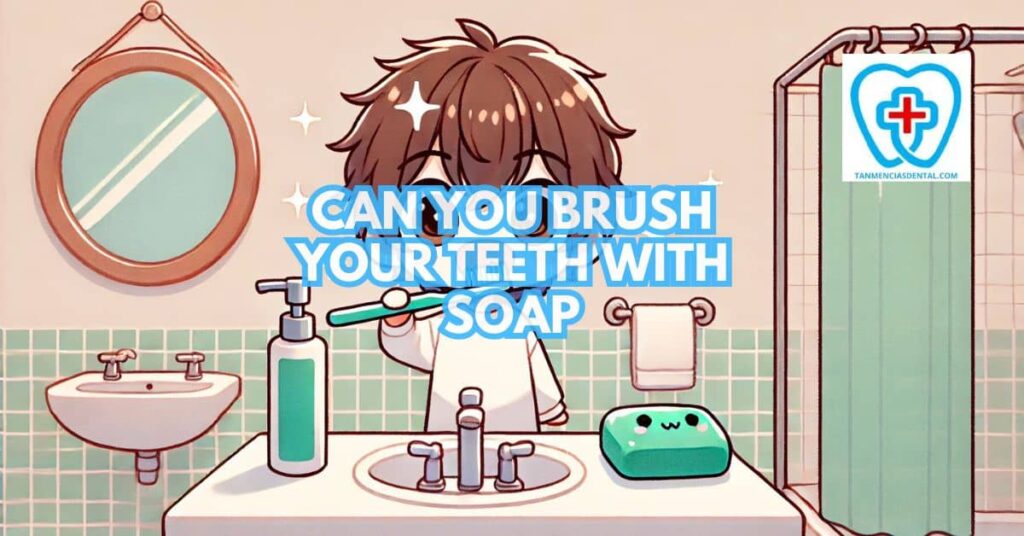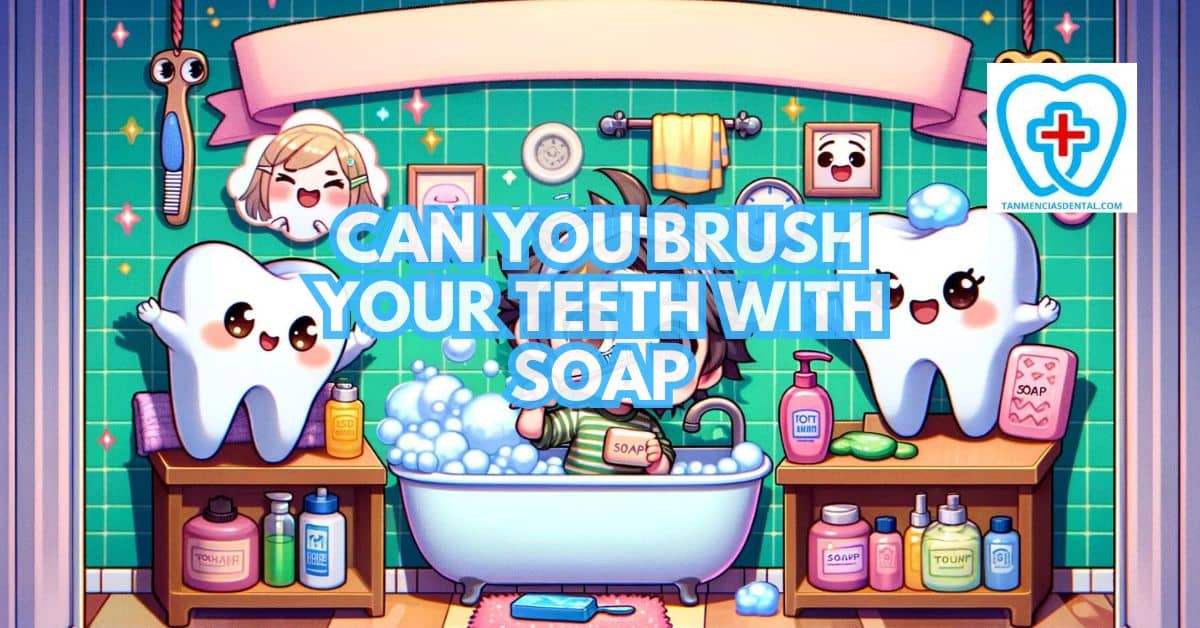Many people ask, “Can you brush your teeth with soap?”
This question often arises when regular toothpaste is unavailable, leading some to wonder if soap can serve as an alternative.
We’ll explore whether soap is effective for keeping your teeth clean and safe for your mouth.
We’ll look at how soap compares to toothpaste and what the science says about using it in dental care.
You’ll have a clear understanding of whether soap should ever be considered for brushing your teeth.
1. In a Pinch: Brushing Teeth with Soap as a Last Resort
In a pinch, brushing teeth with soap can be a last resort if you have no toothpaste available.
Using a toothbrush with a small amount of mild, unscented soap can help remove some plaque and food particles from the teeth.
Not all soaps are safe for this purpose, though; it’s best to choose a natural, unscented bar soap to avoid harsh chemicals or strong fragrances that could irritate your mouth.
Be cautious with the amount, as too much soap can create an unpleasant taste and might make rinsing difficult.
After brushing, rinse thoroughly with water to ensure no soap residue is left, as soap can be drying to the mouth if not fully removed.
It’s also essential to avoid antibacterial soaps with strong ingredients, as these might not be safe if ingested.
Overall, brushing with soap should be a rare, temporary solution until you can access regular toothpaste.
🦷 Are Carbonated Drinks Bad for Your Teeth? Uncovering the Hidden Dangers of Soda and Sparkling Water
2. Why Soap Isn’t the Best Choice: Missing Key Ingredients
Soap does not contain fluoride, which is essential in toothpaste for reinforcing tooth enamel and preventing decay.
Unlike toothpaste, soap also lacks specific compounds that target oral bacteria effectively.
The absence of mild abrasives in soap means it cannot clean teeth as gently or effectively as toothpaste.
Soap is formulated for cleaning skin and contains ingredients that might be too harsh for oral tissues.
Consequently, using soap regularly for oral hygiene can lead to inadequate protection against dental problems.
🦷 Unlock Your Best Smile: Essential Steps for Mastering Effective Oral Prophylaxis
3. Potential Drawbacks: Soap and Mouth Irritation
The use of soap in the mouth can lead to several unpleasant side effects, including irritation of the gums and oral mucosa.
The detergents in soap are more aggressive than those in toothpaste, and they can cause the mouth to feel raw or sore after use.
The continuous use of soap on teeth might lead to the development of canker sores or other types of oral ulcers.
Soap also often leaves an unpleasant, lingering aftertaste that can alter the flavor of food and drinks.
For those with sensitive mouths, even a single use can trigger discomfort or allergic reactions.
🦷 Can Your Teeth Really Fall Out with Braces? Separating Fact from Fiction for Patients
4. How Soap Affects the Bacteria in Your Mouth
Our mouths are home to both good and bad bacteria that help keep our teeth and gums healthy.
Toothpaste is specially made to kill the harmful bacteria while leaving the good ones alone.
When you use soap instead, it can kill all the bacteria, both good and bad.
This disruption can lead to an imbalance, making it easier for infections and gum disease to develop.
Over time, using soap to brush your teeth might cause more serious dental problems because the helpful bacteria are no longer there to protect your mouth.
🦷 Brush Your Teeth Without Water? Discover Clever Tips for Staying Fresh Anytime, Anywhere!

5. The Dangers of Swallowing Soap
Ingesting soap, even in small amounts, can lead to digestive upsets such as nausea and diarrhea.
The chemicals in soap are not designed for consumption and can irritate the lining of the stomach and intestines.
When used for brushing teeth, the risk of swallowing increases, particularly for children who may not be able to rinse effectively.
Symptoms from swallowing soap can range from mild discomfort to severe pain, depending on the amount ingested.
It is crucial to avoid using soap as a toothpaste substitute, especially where the likelihood of ingestion is high.
🦷 Find the Ultimate Mouthwash for Tartar: Effective Solutions to Transform Your Dental Care Routine
6. Alternatives When You’re Out of Toothpaste: Brushing with Water
Brushing with water alone can be a safer alternative when no toothpaste is available.
While water will not remove plaque as effectively as toothpaste, it can still help minimize the buildup of food particles and bacteria.
It’s important to maintain a rigorous brushing technique to maximize the benefits of using water.
Additionally, water rinsing helps stimulate the gums, which can contribute to overall oral health.
This method is especially useful when traveling or in situations where traditional dental products are not accessible.
🦷 Achieve a Healthy Smile: The Benefits of Professional Teeth Cleaning in Marikina
7. Temporary Relief: Baking Soda for Surface Stains
Baking soda, known chemically as sodium bicarbonate, is effective at removing surface stains from teeth.
It acts as a mild abrasive, which can make your teeth appear whiter after brushing.
Baking soda also helps neutralize acidic conditions in the mouth, which are conducive to bacterial growth.
However, because it is abrasive, it should be used sparingly to avoid damage to the enamel over time.
Mixing a small amount of baking soda with water to form a paste offers a temporary solution for cleaning teeth when toothpaste is not available.
🦷 The Unsung Heroes of Modern Dentistry: How Associates Elevate Comprehensive Dental Care
8. DIY Option (for Emergencies Only): Homemade Toothpaste
Creating your own toothpaste can be a practical solution in emergency situations.
A simple homemade toothpaste can be made from baking soda, coconut oil, and a few drops of peppermint oil for a fresh taste.
This combination offers both cleaning power and antibacterial properties, making it suitable for temporary use.
The ingredients are usually readily available in most households, making it an accessible option.
While homemade toothpaste is helpful in a pinch, it does not replace the benefits provided by commercially available toothpastes, especially those containing fluoride.
🦷 Can Gingivitis Be Deadly? Exploring the Serious Risks of Ignoring Your Gum Health
9. Regular Dental Care: Why the Dentist is Essential
Regular visits to the dentist play a crucial role in maintaining overall oral health.
Dentists do more than just clean teeth; they check for signs of gum disease, cavities, and other oral health issues that are not always visible or painful in the early stages.
Professional cleanings eliminate plaque and tartar buildup that is impossible to remove with just brushing and flossing.
These visits also provide an opportunity for dentists to provide guidance on proper oral hygiene practices and address any habits that may be detrimental.
Skipping dental appointments can lead to significant oral health problems down the line, which are often more complex and costly to treat.
🦷 Is a Gum Infection Life-Threatening? Understanding the Risks of Neglected Oral Health
10. Adding to Your Routine: Mouthwash as a Breath Freshener
Incorporating mouthwash into your daily oral hygiene routine can enhance your overall dental care.
Mouthwash can reach areas that brushing and flossing might miss, helping to reduce the overall bacterial load in the mouth.
It is particularly effective in fighting bad breath and maintaining a feeling of freshness.
However, mouthwash should complement, not replace, brushing and flossing.
Always choose a therapeutic mouthwash that contains active ingredients to combat bacteria rather than merely cosmetic products that only mask breath odor.
🦷 Urgent Toothache Relief in Marikina: Your Guide to Navigating Emergency Dental Care
11. Oral Health and Overall Well-being: The Important Connection
Maintaining good oral health is vital for your overall well-being.
Research has shown that poor oral hygiene can be linked to several systemic diseases, including heart disease, diabetes, and respiratory illness.
The mouth serves as a gateway for bacteria to enter the bloodstream, which can lead to inflammatory responses elsewhere in the body.
Regular oral hygiene and dental visits minimize the presence of harmful bacteria and reduce the risk of secondary health complications.
Understanding this connection emphasizes the importance of taking oral health seriously as part of a holistic approach to maintaining good health.
👨⚕️ Conclusion
While it might seem like a convenient quick fix, brushing your teeth with soap is not recommended.
Soap does not offer the specific benefits that toothpaste does, such as cavity protection, targeted bacteria fighting, and safe ingredients for oral use.
The potential risks, including irritation and the dangers of ingestion, outweigh any possible benefits.
For optimal dental health, stick to using products specifically designed for oral care.
In emergencies, alternatives like water or baking soda can provide temporary solutions without the risks associated with soap.
😊 Self-Promotion
Visit us at Tan-Mencias Dental Clinic in Parang, Marikina City, where your smile and oral health are our top priorities!
Our friendly team is dedicated to providing you with the highest quality dental care in a comfortable and welcoming environment.
For any questions or to schedule an appointment, feel free to call us at 9171451074, send us a message through our Facebook page, or use the contact form on our website.
We’re here to assist with all your dental needs and look forward to helping you achieve a healthy, beautiful smile.
Reach out today and take the first step towards a brighter dental future!

